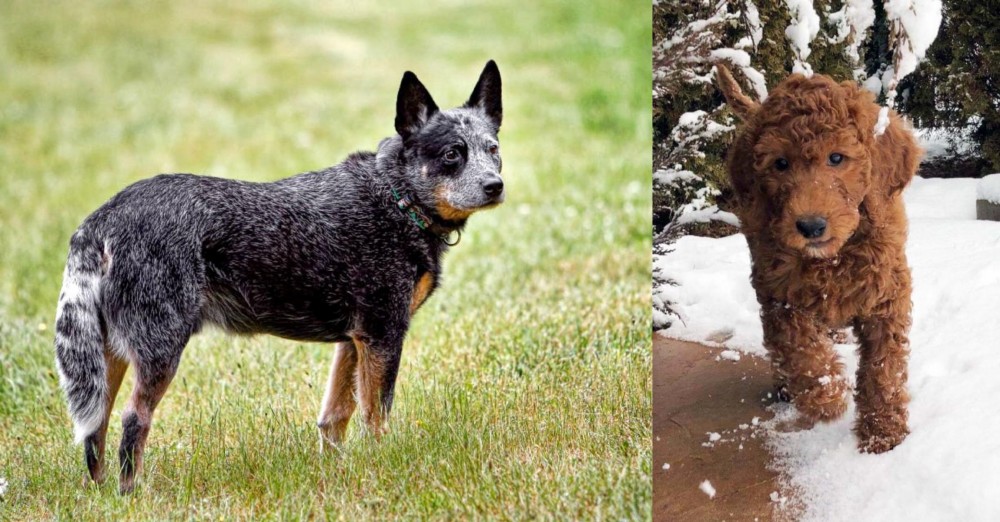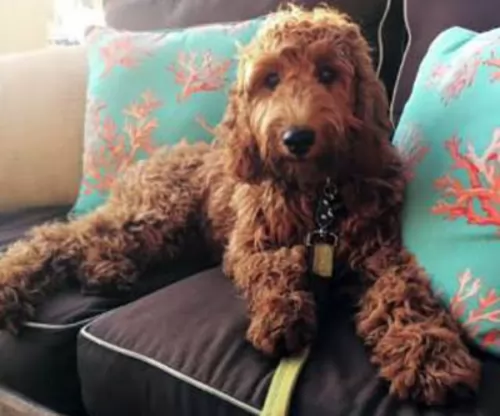 Petzlover
Petzlover Austrailian Blue Heeler is originated from Australia but Irish Doodles is originated from United States. Austrailian Blue Heeler may grow 12 cm / 5 inches higher than Irish Doodles. Austrailian Blue Heeler may weigh 15 kg / 33 pounds lesser than Irish Doodles. Both Austrailian Blue Heeler and Irish Doodles has almost same life span. Austrailian Blue Heeler may have less litter size than Irish Doodles. Austrailian Blue Heeler requires High Maintenance. But Irish Doodles requires Low Maintenance
Austrailian Blue Heeler is originated from Australia but Irish Doodles is originated from United States. Austrailian Blue Heeler may grow 12 cm / 5 inches higher than Irish Doodles. Austrailian Blue Heeler may weigh 15 kg / 33 pounds lesser than Irish Doodles. Both Austrailian Blue Heeler and Irish Doodles has almost same life span. Austrailian Blue Heeler may have less litter size than Irish Doodles. Austrailian Blue Heeler requires High Maintenance. But Irish Doodles requires Low Maintenance
 In 1840, George Elliott made a match with Australian Dingo and Collie and got a clever and very active dog breed – Australian Blue Heeler. Soon, he showed his good herding instincts and protective nature and got really popular among the cattlemen and ranchers. Soon, as the USA soldiers arrived in Australia, they decided that it will be a great dog to bring home.
In 1840, George Elliott made a match with Australian Dingo and Collie and got a clever and very active dog breed – Australian Blue Heeler. Soon, he showed his good herding instincts and protective nature and got really popular among the cattlemen and ranchers. Soon, as the USA soldiers arrived in Australia, they decided that it will be a great dog to bring home.
Australian Blue Heeler has short, double coat. The coat is water resistant and helps them when the temperature is too high as well. Their coat is rough to the touch, naturally. They can be found in blue or red coat colour mix. The Blue Heeler isn’t actually blue, but their black coat has a bluish tint. Red Heelers have red fur instead of black. They have long tails, strong legs, Dingo-like heads with pointy ears and muscular necks and balanced and athletic bodies.
 Known also as the Irish Doodle Setter or the Irish Setterdoodle, the Irish Doodle is a crossbreed – a mix of Irish Setter and Poodle.
Known also as the Irish Doodle Setter or the Irish Setterdoodle, the Irish Doodle is a crossbreed – a mix of Irish Setter and Poodle.
This designer crossbreed comes from the United States. There isn't much of a history with the Irish Doodle, though both breeds used to create this dog breed have their own long histories.
Because the Irish Doodle is a hybrid breed, it isn’t recognized by the American Kennel Club. It is however recognized by the American Canine Hybrid Club.
 This breed is somehow designed for an outdoor life and outdoor activity. This implies that Blue Heelers have nature made of the high dose of energy. They are always ready to go anywhere you go, and they will be a loyal friend. They are actually very clever, intelligent and ready to help.
This breed is somehow designed for an outdoor life and outdoor activity. This implies that Blue Heelers have nature made of the high dose of energy. They are always ready to go anywhere you go, and they will be a loyal friend. They are actually very clever, intelligent and ready to help.
If you are a type of the person who prefers being indoors and having minimal physical activity, Blue heelers are not the type of a furry companion for you. They have a high daily need for the activity, and they love having lots of space to run and explore. Sometimes, you will realize that having a leash is a must because they will get so playful that they will forget about you!
If you start teaching them to be friendly with other dogs while they are still pups, they will accept that kind of lifestyle. But, if your Blue Heeler is raised as the only dog on the ranch, note that they won’t be very friendly toward other dogs.
Since most of the herd dogs usually respond to only one person, most of the Blue Heelers can follow this old instinct. They can be very independent, as well, and they are usually not the type of the dog that will always be around your leg waiting for a cuddle or ear scratch. But, they build the respect towards humans depending on how they treat him so they can be very lovable and friendly pets.
If you are still confused about their name, you must know that the Blue Heelers can actually lightly nip your heel for attention. They are not aggressive, but they tend to be very protective of the family, humans around them and their property.
 The Irish Doodle is a medium sized dog, standing at roughly 33cm to 38cm and weighing roughly 18kg to 31kg.
The Irish Doodle is a medium sized dog, standing at roughly 33cm to 38cm and weighing roughly 18kg to 31kg.
Pet owners appreciate that a dog like this is considered to be hypoallergenic and this attractive aspect of this dog comes from the Poodle side. The Irish Doodle's coat is long, soft and fairly wavy with apricot being the most common coat color but other colors include white, cream, brown and black. The head and muzzle is longish, the eyes brown, the ears floppy and the tail long.
The Poodle and the Irish Setter combine to ensure that the Irish Doodle is an intelligent dog and that he has an amicable disposition so that he is good with kids and pets in the home.
He has a host of excellent characteristics that make him a superb family pet and these are friendliness, intelligence, devotion and loyalty. He is easy to train and training and socialization will make him obedient so that he responds well to simple instructions such as come, stay, lie down, sit etc.
 They are generally good with children, but you must be aware of their inherent desire to herd. Always supervise when your Blue Heeler is around small children.
They are generally good with children, but you must be aware of their inherent desire to herd. Always supervise when your Blue Heeler is around small children.
Ball tricks, frisbee fun, running companion, herding cattle.
It is best to buy a puppy. These dogs get attached to one human and to the territory.
They are generally quick learners. If you teach them to be playful, friendly and loving, they will learn it in no time. So be aware of the decisions that can cost you when the dog grows up.
 The Irish Doodle is guaranteed to make you a great pet. Every dog becomes better when they have been trained and socialized as they require having interactions with other dogs and people to know how to behave around them later on.
The Irish Doodle is guaranteed to make you a great pet. Every dog becomes better when they have been trained and socialized as they require having interactions with other dogs and people to know how to behave around them later on.
The Irish Doodle is a playful, active, attractive, loyal, fun loving pet who will learn easily.
The most important thing to remember with your Irish Doodle is to get involved in his life. He didn’t ask to come to you, but if you do your part and treat him like a much loved family member, you’ll soon see that your life isn’t complete without a wonderful 4-legged friend like the Irish Doodle.
 Progressive Retinal Atrophy usually causes slow and painless loss of sight. This process takes years, but there are cases where this disease took only months before the dog ended up completely blind.
It is advisable to take your Blue Heeler to the vet for a test that can tell you if your dog is carrying the gene for this disease.
Progressive Retinal Atrophy usually causes slow and painless loss of sight. This process takes years, but there are cases where this disease took only months before the dog ended up completely blind.
It is advisable to take your Blue Heeler to the vet for a test that can tell you if your dog is carrying the gene for this disease.
Lens luxation is a disease where the lens of dog’s eye separates partially or completely. Good news is that this disease can be treated.
Most common is the hip or elbow dysplasia. This is the disease where hip joints do not develop properly and begin to grind. This condition can sometimes be treated with physiotherapy, but there is a chance that your Blue Heeler will need a surgery. If you have a habit of regular vet checks and keeping your dog slim and fed with quality food, you can a make a big difference.
Osteochondritis Dissecans (OCD) causes the dog to have excess cartilage and deficient bone, where cartilage does not get replaced by bone during fetal development. This disease usually requires surgery and prescribed medicines.
Congenital hereditary sensorineural deafness – CHSD is a common form of deafness.
Bilateral deafness can be identified when the dog is still a puppy, more-less at six weeks of age. A puppy with deafness in only one ear is harder to identify, but it can happen.
Portosystemic shunt means that the blood flow is getting back into the bloodstream instead of passing through the liver. That means that liver can’t clear out the toxins, and the organ itself fails to grow properly. This inherited type of shunt can be treated with surgery if the diagnose is set on time.
 Irish Doodles are a robust, resilient breed, and with good care they can live to be 11, 12, 13 or 14 years. Nonetheless you need to know about the more common dog illnesses that any dog can develop.
Irish Doodles are a robust, resilient breed, and with good care they can live to be 11, 12, 13 or 14 years. Nonetheless you need to know about the more common dog illnesses that any dog can develop.
These are hip dysplasia, eye problems, ear infections, bloat and Von Willebrand's Disease.You can improve your dog’s health by making sure he gets the very best food there is to eat, a warm, dry place to sleep and that he is treated with lots of love and care.
Von Willebrand's disease is an inherited bleeding disorder. The disorder comes about because of a deficiency of von Willebrand Factor. This is an adhesive glyco-protein in the blood which is necessary for platelet binding or clotting. The condition can lead to excessive bleeding after an injury because the blood can’t clot.
 Choose a dog food that will provide nutrients that will help in the bone developing. Since they are more likely to suffer from joint diseases, you must take this advice seriously. It would be great if you speak about this with your vet before you choose food on your own.
Choose a dog food that will provide nutrients that will help in the bone developing. Since they are more likely to suffer from joint diseases, you must take this advice seriously. It would be great if you speak about this with your vet before you choose food on your own.
The best food for Blue Heeler is a high-quality food which supplies them with premium nutrition to fuel their activity.
They also drink a lot of water, so be sure that they always have a fresh water available.
Lots and lots of the outdoor activity and a quality food. You must be very cautious because this kind of dogs gets overweight easily because they just love the treats and extra food portion.
Any outdoor activity that is mentally challenging and interesting enough to keep them from running in the field trying to catch anything that moves.
 Even though the Irish Doodle's coat is long, this is a dog with just about no shedding, so a brush once a week will ensure his coat stays in tip-top condition. Some Irish Doodle owners like to take their pet to have the coat professionally trimmed.
Even though the Irish Doodle's coat is long, this is a dog with just about no shedding, so a brush once a week will ensure his coat stays in tip-top condition. Some Irish Doodle owners like to take their pet to have the coat professionally trimmed.
The Irish Doodle isn’t one of these dogs where you need to ensure a good dose of exercise every day. He doesn’t particularly need a lot of exercise, so include him in your daily walks and give him a ball game now and then to keep him happy and fit.
As a medium sized dog, your Irish Doodle will require a high quality diet that will ensure he is getting all the right minerals and vitamins he needs for his activities.
If you choose one of the wet or dry commercially manufactured foods, make sure it is one of the best quality ones free from fillers, colorants and preservatives. It is to your pet’s benefit to add in some homemade food to his kibble such as cooked chicken, brown rice, pasta and vegetables.
Raw meat is expensive, but if you can, give him some raw meat occasionally too as this promotes bright eyes, a wet nose and a healthy skin and fur.
Fresh, cool water must be provided every day non-stop.